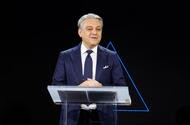Luca de Meo’s Departure: What It Means for Renault and the Automotive Industry
Luca de Meo’s recent resignation as CEO of Renault Group has sent ripples through the automotive world. After five transformative years at the helm, his decision to step down has left many wondering about the future direction of the company and the broader implications for the industry. So, what led to this surprising exit, and what does it mean for Renault and its ambitious plans?
The Impact of De Meo’s Leadership
When de Meo took over in 2020, he brought with him a vision that would reshape Renault’s identity. His Renaulution plan was more than just a catchy name; it was a bold strategy aimed at revitalizing the brand. Under his leadership, Renault embraced electric vehicle (EV) technology, with the revival of the iconic Renault 5 as an EV being a standout initiative. Additionally, the expansion of the SUV lineup and the transformation of Alpine into a performance electric brand showcased his commitment to innovation.
De Meo’s approach not only reinvigorated Renault’s product offerings but also helped stabilize the company’s financial health. His tenure saw a significant turnaround, with Renault reporting some of the best results in its history. This success was not just about numbers; it was about restoring confidence among employees, investors, and consumers alike.
Why Did He Leave?
The official statement from Renault indicated that de Meo is pursuing “new challenges outside the automotive sector.” This phrase often raises eyebrows, prompting speculation about what exactly those challenges might entail. In his farewell message, he expressed pride in leaving behind a “transformed company” with a strong team and a strategic plan ready for the future. It’s clear that he feels he’s accomplished what he set out to do, but the timing of his departure is curious, especially given his previous assertions about having more work to do at Renault.
Industry insiders are already buzzing with theories. Some suggest that the increasing competition in the EV market, particularly from Chinese automakers, may have influenced his decision. De Meo has been vocal about the need for European manufacturers to adapt and innovate to keep pace with these emerging rivals. Perhaps he felt that the groundwork was laid, and it was time for someone else to take the reins and navigate the next phase.
What’s Next for Renault?
With de Meo’s departure, Renault is now in search of a new CEO, and the board has initiated a succession plan. This transition period is crucial. The new leader will need to maintain the momentum de Meo created while also addressing the challenges that lie ahead, particularly in the rapidly evolving EV landscape.
The automotive industry is at a crossroads, with sustainability and technology driving change like never before. Renault has positioned itself as a key player in this shift, but the next CEO will need to build on de Meo’s legacy and perhaps even pivot the strategy to respond to market demands and consumer preferences.
Looking Ahead
As Renault navigates this leadership change, the focus will undoubtedly be on continuity and innovation. The company has made significant strides in electrification and sustainability, and the new CEO will need to champion these initiatives while also exploring new opportunities for growth.
The big takeaway? De Meo’s departure isn’t just a change in leadership; it’s a pivotal moment for Renault and the automotive industry as a whole. As the company seeks a new captain to steer the ship, it will be fascinating to see how they adapt to the challenges ahead. Whether it’s embracing new technologies, expanding their EV lineup, or finding ways to compete with global rivals, one thing is clear: the road ahead is full of potential and uncertainty.

